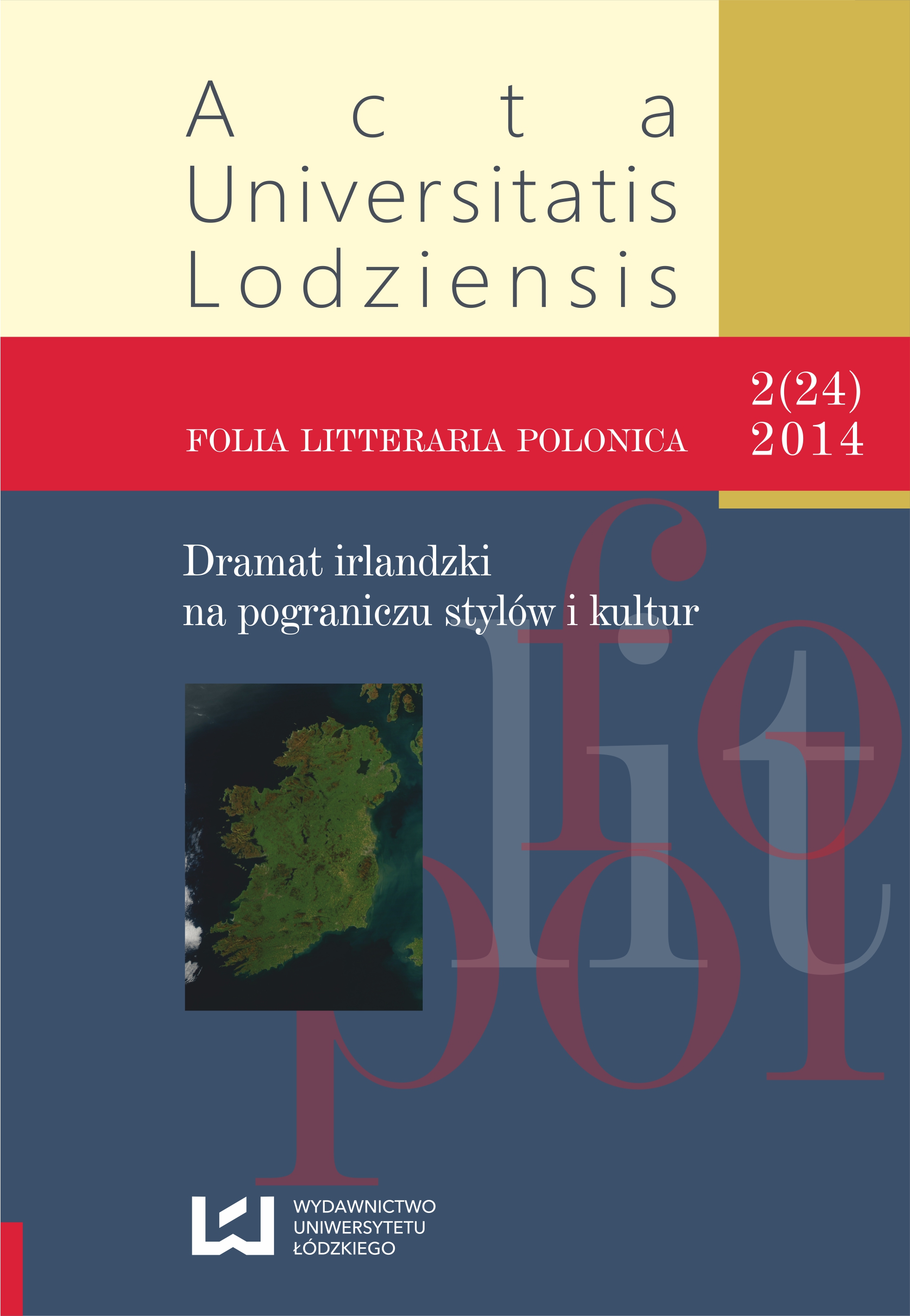Irlandzki dramat Casimira Markiewicza: anty-imperializm i awangarda w Dublinie
DOI:
https://doi.org/10.18778/1505-9057.24.05Słowa kluczowe:
Irish drama, Celtic Revival, Casimir Markievicz, Constance Gore BoothAbstrakt
The article traces the lives of the daughter of the landed class in the West of Ireland, Constance Gore Booth and a son of a Polish aristocratic family, Casimir Markievicz. She, the future Irish revolutionary, he a painter and playwright, through marriage and fruitful collaboration, managed for a period of time to mingle politics and art as well as the political and historical experiences of the Polish and Irish nations. The article traces these mutual interconnections, by looking at a number of plays and paintings by Casimir Markievicz and by analyzing the political and social engagements carried out by Constance Gore Booth. In case of Markievicz and his plays the article interestingly shows how he was able to connect the contemporary, Ibsenian, form of what was then called “New Drama” with coded messages concerning the current politics and his own political views. What is more, Arrington carefully traces the elements of the thesis play and melodrama in his works, reconstructing from authentic reviews of the period the impact they made both on the reviewers and political commentators of the day. Additionally, the article not only paints an interesting picture of the literary Dublin of the inter-war period but also shows how Markievicz’s writing refers to and borrows from the canonical works of such playwrights as Synge, Yeats and Lady Gregory.
Pobrania
Bibliografia
Firín, The Independent Dramatic Company at the Abbey: „The Memory of the Dead”, „Irish Nation and the Irish Peasant”, 23.04.1910, s. 1.
Google Scholar
Kelly M., Irish Nationalist Opinion and the British Empire in the 1850s and 1860s, „Past and Present” 2009, nr 204.
Google Scholar
DOI: https://doi.org/10.1093/pastj/gtp029
Levitas B., Theatre of Nation: Irish Drama and Cultural Nationalism 1890–1916, Clarendon Press, Oxford 2002.
Google Scholar
DOI: https://doi.org/10.1093/acprof:oso/9780199253432.001.0001
MacWhite E., A Russian Pamphlet on Ireland by Count Markievicz, „Irish University Review” 1970, nr 1, s. 98–111.
Google Scholar
Markievicz C.D., The Memory of the Dead: a romantic drama of ’98 in three acts, The Tower Press, Dublin1910.
Google Scholar
Marshal G., Introduction, [w:] Cambridge Companion to the Fin de Siecle, red. G. Marshal, Cambridge University Press, 2007, s. 1–13.
Google Scholar
Précis of reports relative to secret societies (1911–1912), National Archives CO94/13.
Google Scholar
Yeats W.B., Cathleen, córka Houlihana, przeł. T.W. Brzozowski, [w:] W.B. Yeats, Dramaty, Świat Literacki, Warszawa 1994, s. 17–31.
Google Scholar
Garach, The Theatre of Ireland, „Sinn Féin”, 7.12.1907, s. 3.
Google Scholar
Count Markievicz’s New Play, „Irish Times”, 3.12.1908, s. 6.
Google Scholar
Cox J.H., Two New Plays, „Irish Independent”, 4.12.1908, s. 4.
Google Scholar
Cox J.H., A Problem Play, „Irish Independent”, 10.03.1908.
Google Scholar
M.J., The Theatre in Ireland, „Manchester Guardian”, 10.03.1908, s. 14.
Google Scholar
Stephens J., Count Markievicz’s Plays, „Sinn Féin”, 23.04.1910, s. 2.
Google Scholar
O’Kelly S., Lustre, red. B.G. Saul, „Éire-Ireland”, 1967, nr 2.4.
Google Scholar
Pobrania
Opublikowane
Jak cytować
Numer
Dział
Licencja

Utwór dostępny jest na licencji Creative Commons Uznanie autorstwa – Użycie niekomercyjne – Bez utworów zależnych 4.0 Międzynarodowe.











